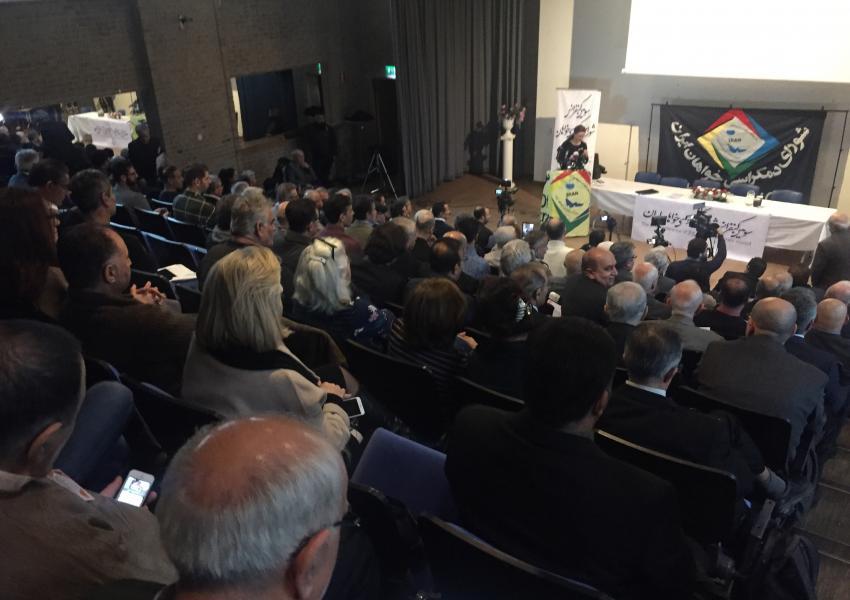
Supporters and Opponents of Federalism in Iran
The third conference of the Iranian Democrats Council was held in Stockholm, on February 8, 2020. Participants, more than a hundred representatives from different political and ethnic groups, discussed ways of forming a far-reaching coalition and defending civil movements in Iran. Some speakers referred to the structure of Iran's future system and mentioned ‘federalism’ and ‘decentralization’ as indispensable necessities to prevent the reestablishment of dictatorship and despotism in future Iran.
Earlier on 12 December 2019, representatives of parties related to "nationalities and ethnicities residing in Iran"* gathered in the European Parliament in Brussels. The central topic was systematic injustice and the structure of the present and future Iranian state. Regarding the state structure, there was an approximately unanimous consensus that after one hundred years of strong centralist experience, federalism might be the proper alternative to overcome injustice and divide power and wealth fairly in future Iran. Referring to their political plans, each party dismissed every form of separatist agenda and insisted that centralism and denying ethnicities their cultural and ethnic rights and their regions’ riches are the biggest threat to Iran.
In addition, after years of negotiations between politicians and activists on the issue of federalism and autonomy, ex-president Mohammad Khatami has recently asserted his opinion on the matter. He said: “The ideal form of public rule is federalism; when I was president, at the interior ministry, we even designated 10 distinct regions, but according to the Constitution we cannot be federative”. This issue has caused heated controversy both inside and outside the country; it has also raised confusion to see reformists mention federalism only after their political project failed. It appears that the reason behind raising this issue is the disillusionment of some former and current officials of Iran with the regime's capability of solving present challenges and reforming political and economic structures.
However, before discussing federalism in present-day Iran, we should consider two points: first, the current political system is by no means a decentralized one and second, both the Islamic and the Pahlavi regimes strongly opposed any form of federalism in Iran. It is worth noting that federalism cannot be seen in the same dual political framework of Iranian politics, which traditionally sets secularism against Islamic movement, democracy against despotism, fundamentalism against reform, capitalism against socialism and state hegemony against civil society; it does not fit in any form of dualism. Some Iranian seculars and democrats reject federalism as much as Islamists, and hence, debates concerning federalism have always been beyond common political frameworks and challenge many sociopolitical concepts.
Speaking of federalism at this point in time might bear on three factors. First, the central government’s weakness and failure to provide services to citizens in marginal and border areas, second, some ethnic and national groups’ deep inclination toward separatism and autonomy, and third, constant suppression of ethnic and national groups and systematic violation of their right of mother tongue education and electing their local authorities.
Arguments in Favor of Federalism in Iran
Iranian federalists seek to prove federalism’s cultural, political and economic legitimacy, credit and functionality. Their five main arguments are:
- In the long run, federalism is the only way to maintain Iran’s unity. Considering Iran’s population diversity, a system that does not provide real political participation for its citizens can never secure Iranians national unity. Moreover, federalism will not be for a specific region or ethnicity, rather, it will be for entire Iran. Those who consider federalism a plan for the country’s disintegration, need only to glance at successful cases of federalism around the world. Many countries such as India, Canada, Germany, the United States among many other bigger and more populated countries than Iran, have experienced federalism without falling apart. On the contrary, despite the different cultural and religious backgrounds of nations in these societies, federalism has managed to keep the geographical unity and cohesion of these countries. While no federal country has ever fallen apart, all countries which disintegrated had centralized and nonfederal systems.
- Decentralization as a result of federalism provides the means to fight corruption. One of the main reasons behind corruption in Iran is the concentration of wealth and power in the hands of a certain group of officials who are either from the same ethnic and national background or pursue the values of the ruling ethnic and national group. Even if they could come to power through democratic elections (which they currently cannot) the accumulation of immense wealth and power leads to unrestrained and systematic corruption.
- Compared to centralist states, federal states have shown excellent competence in overcoming local challenges. In fact, federalism is not a political ideology; it is an effective way to solve regional problems. Nearly 9 decades of picking rule from Tehran is proven as a failed management strategy for the country’s development which works to the detriment of regional development and management. Additionally, centralist legislation in a country with environmental diversity, enormous wealth and a high population density has been utterly unsuccessful.
- The current centralist and non-federal regime does not believe in the active ruling of provinces and cities over their local resources. The current regime transfers an area's natural resources such as water, minerals, and oil to other parts without the local populations benefitting from them. This unfair division of resources has led to enmity between people from different regions of the country.
- Setting aside the brief contemporary history of Iran, the annals of ruling systems in Iran show that a degree of autonomy had always been granted to areas that pertained to the empire. In such a system, the ruler was called ‘the king of kings’, meaning, that there were other kings who enjoyed a great deal of independence and whose contact with the central government was through the taxes they paid.
Arguments Against Federalism
Similar to the defenders of federalism, its opponents have their own arguments against a federal form of state. Four of their main arguments are mentioned below:
- Given the chance and if political and security pressure is no more exercised on them, the ethnic groups that request autonomy will be encouraged to claim geographical independence. Several parties and groups around Iran have raised their separatist intentions and call themselves ‘nations’ instead of ‘ethnicities’. Under such circumstances, federalism is against national interest and serves as an introduction to the country’s disintegration.
- Ever since 150 years ago, there has been no clear plan or idea to accept and execute federalism in Iran. So, accepting and executing federalism in a country that has never practically experienced it would lead to chaos. Federalists have given no practical plan to transition from a centralist to a decentralist state and, besides, the minimal experience of city councils and village councils renders too weak a structure upon which to build a federal system. In a federative system, local governments have rights and responsibilities that people and the political elite cannot accept.
- Empowering civil institutions and internalizing democracy can render the same results as what can be achieved through federalism. Therefore, instead of federalism, we shall focus on strengthening civil and democratic institutions.
- Federalism was a way to unite diverse nations and is ineffective for ruling a unified country. Iran has a solid identity and does not need to recreate this identity to accommodate and justify federalism.
The Islamic Republic and Political Ruling of Iran
The Islamic Republic has opposed any form of autonomy and federative self-governance ever since it initiated. The Iranian political regime is irrelevant to the arguments mentioned above, as this regime, similar to the monarchy before it, is a centralist system whose legislation, policies and decisions are made by the governing elite. Therefore, as long as the Islamic Republic is in power, it is impossible to have federalism in Iran.
*In their statements and public speeches, many groups and parties who are in favor of federalism have introduced Iran as a country with multiple ‘nationalities’, to which these groups are related, while opponents of federalism do not accept this concept of ‘nationality’ and believe Iran to be made up of different 'ethnicities'. This article does not seek to study the various definitions of these two concepts. Therefore, the two terms are written together in order to bear both definitions in mind.









